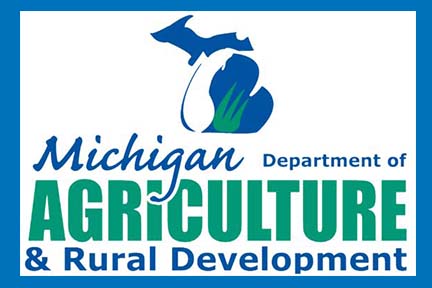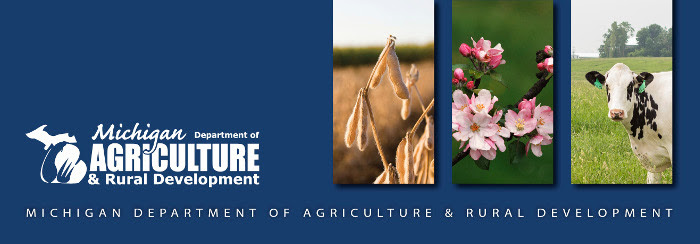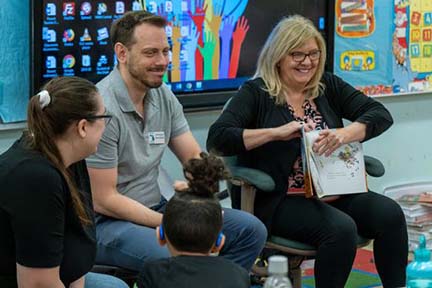For immediate release: February 8, 2024
Media contact: Jennifer Holton, 517-242-2575 or Chelsea Lewis-Parisio, 517-331-1151
When Serving up Super Bowl Snacks, Don’t Fumble on Food Safety!
Play it Safe and Keep it Local for Game Day
LANSING, MI – As Michiganders gear up to watch the big game this Sunday, the Michigan Department of Agriculture and Rural Development (MDARD) reminds party hosts to play it safe when handling and serving Super Bowl snacks. And, when planning your menu for game day, make sure your game plan includes Michigan food and agriculture ingredients.
“There are two ways to host a winning Super Bowl watch party,” said MDARD Food Safety and Animal Health Bureau Director Tim Slawinski. “First, take a few easy steps to prevent foodborne illness and keep your family and guests healthy; and second, feature Michigan grown and processed foods for a winning menu.”
Game on!
Here are a few tips to play it safe on game day:
Wash hands immediately before and after handling food. Research shows that 99 percent of people don’t wash their hands correctly. To properly wash your hands, wet your hands with water, lather with soap and scrub for 20 seconds. Rinse your hands and dry with a clean towel or paper towel. Clean and sanitize all cooking surfaces and utensils, especially after handling raw meat. You’ll also need to wash your hands often throughout the game.
- Don’t mix players from different teams.
Keep raw meat and poultry separate from other foods like fresh fruits and vegetables by using separate cutting boards and utensils. This will prevent cross-contamination of bacteria and keep your MVPs from getting food poisoning.
Foods should not be left at room temperature for more than two hours. Know when you plan to serve the food and set a timer to remind yourself to start packing up leftovers. If you plan on serving food throughout the game, make two portions of each dish. Serve one portion as the game starts and keep another portion in the refrigerator or oven to rotate out after half time.
No matter the season, bacteria love the temperature Danger Zone — 40°F (4°C) and 140°F (60°C) — and will grow rapidly within 20 minutes if they are in this in that temperature environment for more than 2 hours. Read more about the Danger Zone.
- The right equipment counts.
Stock up on shallow food containers and make sure you’ve got extra space for them in your refrigerator or freezer. Use a food thermometer to ensure that food reaches a safe internal temperature when you’re cooking and that leftovers reach 165°F when you reheat them. Here are the recommended internal temperatures for some Super Bowl party favorites:
- Chicken wings = 165°F (74°C)
- Burgers and sliders = 160°F (71°C)
- Chili and other reheated foods = 165°F (74°C)
- Before halftime take a timeout and insert substitutes into the game, if needed.
Check your food with a food thermometer to make sure hot foods are still hot and cold foods are still cold. Ensure you’re keeping crockpots on the “warm” or “low” setting; and always use a cold source (such as a bowl of ice) below cold foods and check throughout the party to make sure dips and cheeses are still cold. Discard any food that has been out for more than two hours. Bring out fresh portions of food that you’ve been keeping hot or cold.
Pack any leftovers in small portions in shallow containers and place the containers into the refrigerator or freezer immediately. When you’re reheating leftovers, make sure they reach 165°F, as measured by a food thermometer.
By following these tips at your Super Bowl gathering, you may be celebrating more than just a team victory – you’ll be celebrating a successful party and healthy, happy friends and family.
Support the Home Team!
MDARD and the Michigan Ag Council teamed up with Michigan farmers represented by the Michigan Beef Industry Commission, Michigan Pork Producers, United Dairy Industry of Michigan, and Michigan Sugar Company to bring you some “Michigan GROWN, Michigan GREAT” recipes for your Super Bowl celebration.
When you think Michigan first, you’re sure to score big, from appetizers and main dishes to desserts and cocktails. Check out these delicious Michigan recipe ideas to kick off your celebration. If you try a recipe, post a picture on social media with the hashtag #MIMade4SuperBowl and show off your Michigan snacks.
“Buying Michigan-grown and processed food products supports our local economy and our hard-working farm families,” said Slawinski. “This Super Bowl Sunday, why not try some recipes using products grown and made here in Michigan? When we all support ‘Team Michigan’ our food and agriculture industries thrive.”
For more information about Michigan’s food and agriculture industry and other recipe ideas, visit MichiganGrown.org.
For more food safety tips, call the USDA Meat and Poultry Hotline at 1-888-674-6854; email or chat at Ask USDA; or visit FoodSafety.gov. |








